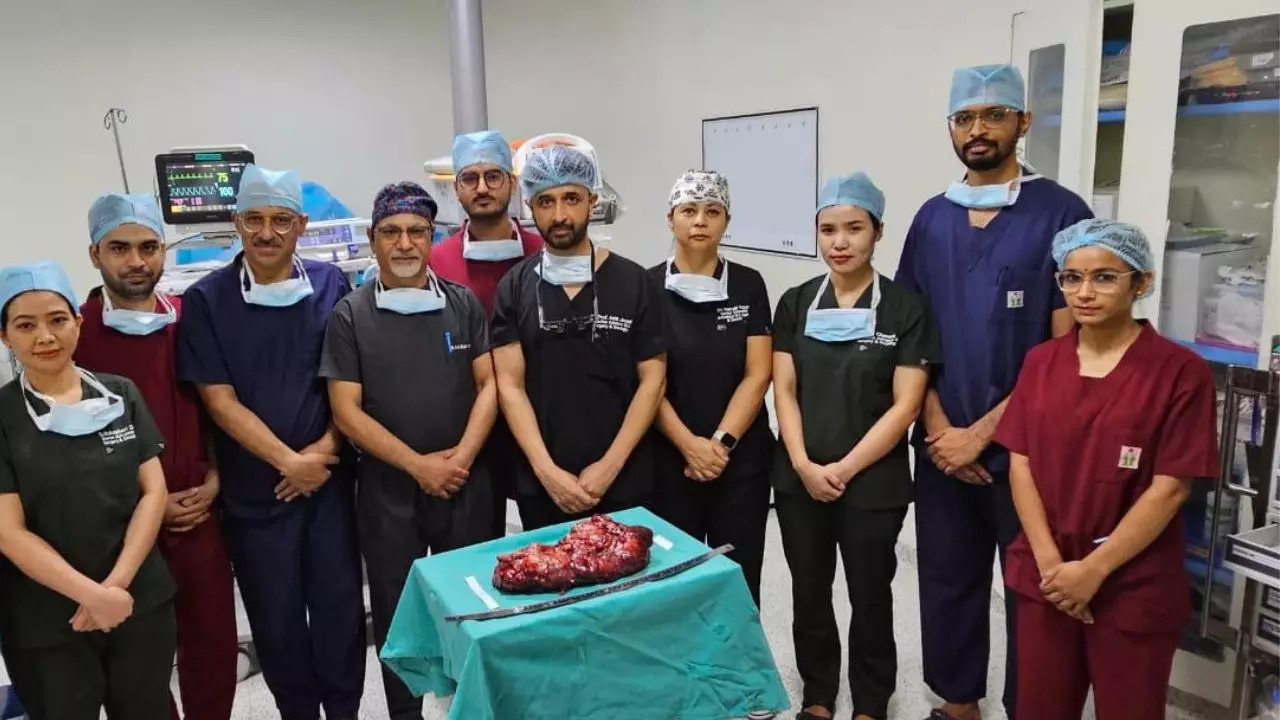Contents
-
news
-
Health
Gurgaon doctors remove huge football-sized 9 kg cancerous tumor from a woman’s stomach
Doctors at a hospital in Gurgaon have successfully removed a massive 9 kg cancerous tumor from the stomach of an African woman. The football-sized tumor had been causing him extreme pain and discomfort for the last 6-7 months. According to doctors, if it had not been removed in time, this tumor would have started suppressing major organs like kidney and urinary tract. Read on to know more.

The cancerous tumor measuring 35x20x30 cm was causing extreme pain and discomfort to the patient for the last 6-7 months.
In an extraordinary display of medical expertise and teamwork, doctors at Fortis Memorial Research Institute, Gurugram successfully removed a huge 9.1 kg cancerous tumor from the stomach of a 55-year-old African woman.
according to doctors Cancerous tumor 35x20x30 cm in sizeThe patient was suffering from extreme pain and discomfort for the last 6-7 months. Cancerous tumors – also known as malignant tumors, are abnormal masses of tissue that grow and spread uncontrolled. The team led by Dr Amit Javed, director of gastrointestinal oncology, Fortis Memorial Research Institute, removed the tumor, which he said was compressing several vital organs and hanging like a football from the stomach.
This was a high-risk surgery
According to Dr Javed, before coming to India, the patient said she had visited several hospitals in Africa for treatment, but was refused surgery due to the size of the tumor, its location and the high risks associated with the complication.
However, after being admitted to the hospital, the woman underwent extensive testing, including CT angiography and PET scans, which could reveal the presence of a huge vascular tumor inside the abdomen. Due to its size, the tumor was compressing all the vital structures of the body – including the urinary tubes, kidneys and its point of origin was difficult to analyse.
However, doctors performed the surgery in a procedure that lasted about three hours and remarkably the patient was discharged in stable condition in just four days.
“The surgery was very challenging because of the size of the tumor and also because we were not able to trace the origin of the tumor due to its vastness. “After surgery, we determined that the tumor was originating from the stomach wall – such tumors are often gastrointestinal stromal tumors (GISTs) which are rare cancers that form in the walls of the gastrointestinal tract,” Dr. Javed told the media persons.
According to Dr. Javed, if left untreated, the cancerous tumor could cause serious, life-threatening complications to the patient’s health. “Fortunately, in this particular case, the tumor was not involving other vital organs, and had it not been treated, the patient could have suffered other health complications due to compression of vital organs. The most common complication of such tumors is bleeding, which could have been life-threatening given the size of this tumor,” he said.
Yash Rawat, Facility Director, Fortis Memorial Research Institute, said, “This case was particularly challenging due to the extensive size and weight of the tumor. Yet, our team of doctors led by Dr. Amit Javed handled it with extraordinary skill Clinical expertise and best-in-class care to manage such cases is the hallmark of Fortis Hospital Gurugram, and we continuously strive to provide the highest level of care to save lives and achieve better outcomes.
What causes cancerous tumors?,
According to experts, tumors form when abnormal cells pile up, forming an overgrowth or mass. Your body constantly creates new cells to replace old or damaged cells that are destroyed. To form a neoplasm, cells do not destroy as expected, but instead cells accumulate, causing the tumor to grow.
It can affect anyone at any age, however, the specific factors that increase the likelihood of developing the neoplasm vary depending on the type. Common risk factors include:
- gene mutations such as the BRCA gene
- inherited conditions such as Lynch syndrome and neurofibromatosis
- Family history of certain types of cancer, such as breast and prostate cancer
- smoking and alcohol
- previous radiation exposure
- viruses like hpv
- obesity
Get the latest news live on Times Now with breaking news and top headlines from around the world.


